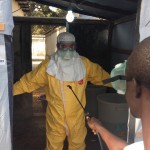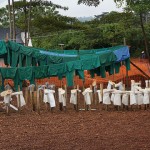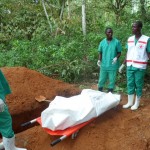As the worst Ebola epidemic on record shows no signs of abating in West Africa, fear and ignorance are increasingly said to be playing a role in its continued spread. Meanwhile, local practices such as the consumption of bushmeat and deforestation are the go-to explanations for the epidemic’s underlying causes. However, decades of anthropological research in the region by STEPS Centre and Institute of Development Studies (IDS) researchers, indicates not only that this picture is an over-simplification, but that disease control policies based on these ideas may be unhelpful.
Over two thirds of all human infectious diseases have their origins in animals. The rate at which these zoonotic diseases have appeared in people has increased over the past 40 years, with at least 43 newly identified outbreaks since 2004. In 2012, outbreaks included Ebola in Uganda, yellow fever in the Democratic Republic of Congo and Rift Valley fever (RVF) in Mauritania. Zoonotic diseases have a huge impact – and a disproportionate one on the poorest people in the poorest countries. In low-income countries, 20%
Continue reading →
The study analyzes the traditional beliefs and practices concerning leprosy of the Limba people of Sierra Leone. It shows that this dialectally diverse ethnic group has two views of leprosy and its cause, and two varieties of stigma associated with the disease. The Limba have abandoned their traditional treatments for leprosy in response to an effective leprosy control programme, but retained their traditional world view, including its definition of illness, which holds a person seriously ill only when he has severe pain or disability. Thus,
Continue reading →
This is a chapter on Kissi Funerals in the region of Guekedou and Kissidougou. Whilst this is based on fieldwork conducted in 1945-6, many of the ritual practices and meanings were current and observed in Kissi villages in 1991-3. For the Kissi, every life has three critical moments: birth, initiation, death. The primary role of the funeral ritual is to allow access to the rank of an ancestor; a more elevated social rank. Hence the first hours are given to expressing pain (or gladness for
Continue reading →
People who live in the Sherbro coastal area of Sierra Leone have a social organisation based upon descent from named ancestors and acestresses. Ancestors, the living, and those not yet born constitute a great chain of being. This continuum of existence is punctuated, and made discontinuous, by rites of passage (birth, puberty, death). Dying is a period of categorical ambiguity in which a person is still among the mundane living, but babbles of the past, a sign that he or she is also in the
Continue reading →


